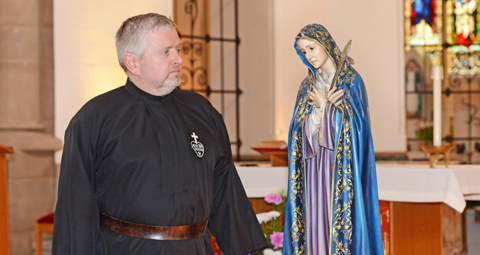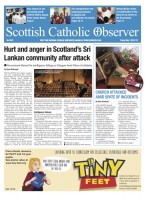BY Daniel Harkins | October 5 | ![]() 0 COMMENTS
0 COMMENTS ![]() print
print

Serving the crucified amid Belfast’s Troubles
DANIEL HARKINS speaks to Passionist Fr Gary Donegan about his experiences helping schoolchildren through bombs and abuse
Walking down the driveway on his fifth day in his parish, Fr Gary Donegan heard a cry from a nearby policeman: “Oi, padre, run!”
Grabbing at his black Passionists habit, the priest bolted as the authorities executed a controlled explosion at the church gate.
This, Fr Donegan would realise, would be his life for the next 15 years in Holy Cross parish in Ardoyne, an area of north Belfast that would see some of the most explosive scenes of the Troubles in the 21st century.
Fr Donegan, spoke to the SCO during a period last month in St Mungo’s parish in Townhead, Glasgow. Having left his parish and now living in a retreat centre outside Belfast, the Passionist priest now spends his days working on peace and reconciliation, drawing on his experiences mediating disputes in the North of Ireland.
The most high profile of these would begin just five months after his posting to Ardoyne in 2001. The area was segregated between Catholics and Protestants, and the local Holy Cross Primary School was located in a Loyalist Protestant enclave. As tensions in the divided community increased, loyalists began blockading the route to the primary school, with stones being thrown at the Catholic children as they made their way through the Loyalist area.
Attempts by community leaders, including Fr Donegan, to mediate a solution over the summer break failed, and when the pupils returned to school, some of the most infamous scenes of the Troubles would be broadcast across the world.
As loyalists mobs gathered on the route to the school, Fr Donegan and a fellow priest from the parish Fr Aidan Troy donned their habits and walked the route with the schoolchildren.
“Not in our wildest dreams did we think it would be as bad as it was,” Fr Donegan said. “We had to walk this gauntlet. I had this big, full beard and by the time I got to the school my beard was covered in spit. I was trying not to throw up. This was happening to children as well. I was hit with rebar [small pieces of steel]. We got hit with dog excrement, urine in balloons, and on September 4 that’s when the bomb was thrown. That’s when I thought, ‘someone is going to die.’”
The pictures of terrified schoolchildren running from the explosion made headlines around the world. However, the attacks on the Twin Towers in New York a few days later wiped the story from newspaper front pages. Eventually, the blockade ended, though violence would reignite a few times over the following years.
“I felt that society failed,” Fr Donegan said, looking back. “If this had been happening in London or Glasgow or Dublin, every union, every politician would have come out, but because Ardoyne was seen as this little enclave it wasn’t.”
“When you look at the Troubles and the numbers who died, Ardoyne had the largest loss of life. I witnessed the Troubles in my home parish but it wasn’t in your face 24/7.”
A sense of hopelessness in the Belfast community, and the ‘pressure cooker’ environment, lead to a spate of suicides in Fr Donegan’s Ardoyne parish. On one occasion, he said he climbed the scaffolding around the church tower to bring down a young man who had hanged himself. More young men died from suicide in both the North and South of Ireland than in the violence from the Troubles, he said.
The deaths took their toll on Fr Donegan, who was eventually ordered to take a sabbatical in San Francisco to recuperate.
The priest’s childhood had, to an extent, prepared him for the violence, growing up in a border town that saw regular fallout from the Troubles. On one occasion, Fr Donegan said his sister was blown off the couch by the explosion from a bomb.
“Right through my childhood you would get periodically someone ringing the door on a Saturday night when we were about to watch Match of the Day, people saying ‘Can we stay with you?’ because they had been evacuated because of bombs.”
It wasn’t the Troubles though that led Fr Donegan to the priesthood, but instead personal tragedy. A childhood friend of his who lost his father and two brothers in a road accident, before being flown to Glasgow to be treated for a rare form of cancer, rose in Fr Donegan a desire to ‘serve the crucified’—as well as a lifelong affinity for Glasgow. And the positive effect a local priest had on a suffering aunt brought him to the Passionists.
“My aunt was dying of cancer and this Passionist priest came in, and as soon as he did her whole countenance changed and peace and serenity came over her,” he said. “And I thought, maybe this is what God wants me to do. And then I thought, ‘Forget it big lad, not me. I want to be married, five children, nice house, play football for Fermanagh.’ And I used to go to the church and I would fight with God. But I thought, sure, I’ll join and they’ll throw me out anyway.
“The headmaster of the school once lined us up against the wall—we thought we were going to get shot—and he asked us what we were going to do [for work]. He said, ‘Donegan, son, what are you going to do?’ And I said ‘I think I’m going to be a priest.’
And he put his head in his hands and made a groaning noise and said, ‘Priest? You wouldn’t make an altar boy.’
“That was my reference. And when I told mama, she said, ‘you wouldn’t last a fortnight.’
Fr Donegan did become a priest, and his experiences have given him a unique understanding of the damage uncertainty in Northern Ireland can cause. He speaks passionately about the dangers and absurdities of Brexit. He explains that his mobile phone network changes depending on which room he is in in his parents’ house on the border, or what side of the bed he is lying on. Post-Brexit, he says, he could be lying in bed and ‘if I roll a half-inch one way or the other, I’m getting roaming charges.’
He says fears of violence after Brexit are very real, with a risk of giving oxygen to dissidents. And while he doesn’t believe large numbers of people would be involved in violence, ‘you don’t need massive numbers for destabilised situations.’
“Since the Good Friday Agreement there has been a number of policemen and prison officers killed by so-called dissidents. If they target the border, how would Theresa May or anyone holding that office react? If dissidents start killing customs men, how could you not react in a military fashion?”
“My fear, and I’m very much not on my own on this, is that you will see soldiers back on the streets of Belfast and the north of Ireland within weeks of Brexit,” he added.
Fr Donegan sees his ministry as very much following the instruction of Pope Francis.
“[The Pope] said we have to go out and smell the sheep. It’s so easy to get disillusioned if you sit behind the desk. You’ll never feel the warmth. That’s why [my time in Glasgow] has been like Disneyland. The affection of the people here. The warmth of the people. I gave this daft experience [while speaking in St Mungo’s] about how my feet had been damaged [during the papal visit to Ireland] and walking about in thousand-mile socks, and this wee woman came up to me the next day with three pairs of socks. That could only happen in Glasgow.
“If you didn’t share that—if you’re sat behind a desk and not shaking hands—you don’t get that feeling of love.”
He sees much affinity between Belfast and Glasgow, a shared sense of humour and irony. And he has used that sense of humour to help him cope with the traumatic things he has witnessed during the troubles.
“This was a journey I never expected to go down and nobody who knew me expected me to go down,” he said. “But the whole idea was being with the crucified. If St Paul of the Cross [the Passionists’ founder] was alive today, would he find a better place to work with the crucified than Ardoyne?
“In 2001 when I was put in that situation, Aidan and I stepped up to the plate because it was what we thought was the Christ-like thing to do. We needed to be there for those children. That’s what we were ordained for, not for an institution but to serve. The moment the oil touched our hands at ordination, that is our mandate: to love and to serve.”










